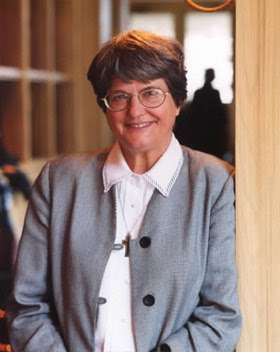 ANNETTE FUENTES
ANNETTE FUENTESNew America Media
Editor's Note: Sister Helen Prejean (photo on right), known for her crusade against the death penalty and her book "Dead Man Walking," warns that the "culture of death" is still celebrated despite waning support for the death penalty in states around the country.
Sister Helen Prejean says it took her 40 years to “wake up” to the social injustices around her in New Orleans, but maybe it would have happened faster “if I had grown up in California.”
With the mesmerizing cadence of a preacher and the down-home humor of her Louisiana upbringing, Prejean spoke at the Diablo Valley Peace and Justice Center in Walnut Creek on March 30. A nun of the order St. Joseph of Medaille, the 60-year-old described awakening to her calling: a crusade against capital punishment. “Enlightenment is a gift,” she said to a packed auditorium. “It’s always a surprise. You never know when it comes and you can’t make it happen.”
Prejean is one of the most visible public figures in the movement to ban the death penalty, owed in great measure to her first book, “Dead Man Walking,” and its 1995 Hollywood film adaptation starring Susan Sarandon and Sean Penn. Sarandon won an Oscar for her portrayal of the nun. Prejean won wider celebrity. She uses it in her ceaseless campaign to raise consciousness about capital punishment.
Her own consciousness about the criminal justice system began in the early 1980s as nuns brought back stories of liberation theology from their work with the poor in Latin America. Prejean began to work with the poor in her own backyard, in St. Thomas public housing projects, which abutted the convent property. “That’s where all the violence happens,” she explained.
When someone asked her to be a pen pal to a Louisiana State Penitentiary inmate, Prejean said, “Sure. I was an English major. I can write pretty letters.” The inmate was Patrick Sonnier, a confessed murderer, and Prejean began a two-year journey into the heart of darkness of death row where she formed a friendship with Sonnier and became a fervid opponent of capital punishment.
“The first time I visited him, I’m scared, I’m so out of my element. I thought, ‘He murdered somebody!’ I could hear his leg irons dragging across the floor. That was the first sound I hear from him. Then I heard a Cajun accent,” she recalled. “I thought his face would mirror that he had murdered someone. But he was smiling and said, ‘Thank you for visiting me.’”
Prejean visited Sonnier in the role of spiritual advisor until his execution by electrocution in 1984. Since then, she has accompanied five others to their deaths, an act motivated by her belief that all humans are deserving of compassion. “In the web of life, if we can say about some human beings that they are disposable and cut them out of the web of life,” she said, “we have to turn a switch inside ourselves to say, ‘You are not human like us.’”
Official support for the death penalty has been waning in states around the country, Prejean noted, with New Mexico the latest to ban it. But she wagged her finger at California. “You have 600 people on death row. You have got to figure this out. How does this happen?” she said. “Is it connected to any system you have? Why 600? It’s all about changing consciousness.”
Prosecutors and their frequent bias in favor of seeking the death penalty are part of the system that needs changing, Prejean asserted. “After prosecutors say they’re going after murder one, they put on the blinders and say, ‘We’re going after the death penalty.’” In Louisiana, that attitude is part of a “culture of death,” she said, that prosecutors seem to celebrate. “Louisiana is so bad,” Prejean said. “They give each other this little award—the Louisiana Prick award. It shows a pelican flying with a hypodermic needle in its beak.”
To overturn the “culture of death” fostered by capital punishment, Prejean calls for simple, vocal activism by ordinary people. “People are not so enthusiastic about the death penalty as they used to be,” she said, noting that among Catholics, support has dropped significantly to 49 percent. “The more voices raised and the more dialogue, legislators will start to listen. Especially the voices of young people. They love to be loved by young people.”
No comments:
Post a Comment